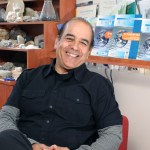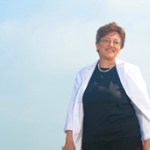Science Teaching
Prof. Nir Orion
Science Teaching researcher Prof. Nir Orion recently returned from Peru, where his award-winning Blue Planet teaching unit was adopted by the Peruvian Ministry of Education
Q: You have been working for many years to get schoolchildren out of the classroom setting. Why?
A: Schools in general and science teaching in particular are supposed to teach children about the world they live in. But they do it in a sterile environment that is disengaged from the real world; and thus many students do not find relevance or personal meaning in the subjects they “learn.”
There are,…
The world – or at least a large swathe of Israel – was their classroom. An unusual international conference for science teaching experts started out at the Clore Garden of Science, on the Weizmann Institute campus. From there the “nomadic” conference made its way down to Eilat at the southern tip of the country, Jerusalem in the east and points in between.
Outdoor Learning Environment conference at the Ramon crater
Participating in the first international Outdoor Learning Environment conference were science education researchers from the US, UK, Canada, Denmark, Germany, Sweden, Portugal,…
In this country, as in much of the Western world, we are constantly bemoaning slipping scores in math and science. So here's a bit of good news: The first 26 science teachers to participate in the Rothschild-Weizmann Program for Excellence in Science Teaching will be receiving their degrees in science education in a few weeks. This M.Sc. program is directed by the Feinberg Graduate School at the Weizmann Institute of Science.*
The idea of the program is simple: To improve science education, invest in the teachers. The Weizmann Institute invited high-school science and math teachers who…
Science education faculty don't get no respect
At least that's a strong conclusion from a paper in the December 19th issue of Science (1). According to the article almost 40% of the 59 science education specialists, surveyed in the California University system, were "seriously considering leaving" their current jobs and some (20%) were considering leaving the field entirely.
Why?
Figure 1. Are science education specialists the Rodney Dangerfields of academics?
Before we continue, some more background information is in order. Who are these science education specialists and why do we have…
I had some strange notions when I made the jump from working at the lab bench to teaching at the white board. I thought good teaching meant interesting lectures. And I was completely unaware that people actually conducted research in science education. If I had been asked about education research, I would have replied that it was largely anecdotal, probably limited to sociologists and primary grades, and as far as I was concerned, useless.
And, honestly, to me it was useless.
I never saw any of science education articles or journals. No other instructors every discussed them and…


